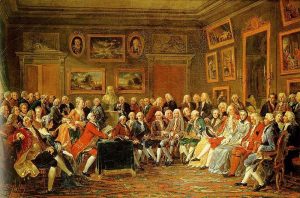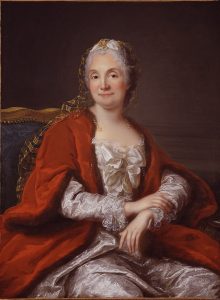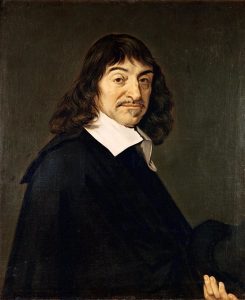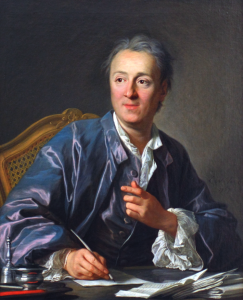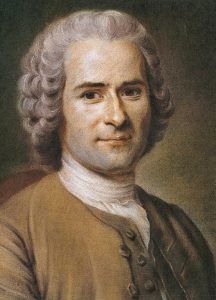The “Woman Question”
“Bodily strength from being the distinction of heroes is now sunk into such unmerited contempt that men, as well women, seem to think it is unnecessary; the latter, as it takes from the feminine graces…; and the former, because it appears inimical to the character of a gentleman” – Mary Wollstonecraft, 1791
During the time of the eighteenth-century Enlightenment, on the issue of the conversations in British, French and Germany salons of the educated upper class was the role and status of women in society. These salons, private gatherings in the home of wealthy upper-class men and women from the aristocracy and bourgeoisie, dedicated to discussions about arts and sciences, society and politics, gave women a unique opportunity to address the gender relations. One example of such a female host was Marie Thérèse Rodet Geoffrin (1699 –1777), who has been referred to as one of the leading female figures in the French Enlightenment. From 1750 to 1777, Madame Geoffrin played host to many of the most influential Philosophes and Encyclopédistes of her time.
The debate in these salons was according to historian Karen Offen therefore important for “asserting women’s equality to men, for criticizing male privilege and domination, for analyzing historically the causes and construction of women’s subordination, and for devising the eloquent arguments for the emancipation of women from male control.” The enlightened debate surrounding women’s equality and rights have come to be collectively referred to as the “Woman Question,” which was discussed by most famous contemporary philosophers.
One of the first French philosophers to address this issue was René Descartes (1556-1650). He argued that women had equal capacity to reason, because “reason operates independently of the body.” In addition, his claim for gender equality was grounded in the Christian doctrine of the “equality of souls.” Descartes’ idea influenced other writers such as François Poulain de la Barre (1647-1725), who published an essay titled On the Equality of the Two Sexes in 1673, in which he built on the Cartesian model, suggesting that “the mind has no sex.”
One of the most significant impacts of Descartes’ argument of gender equality was that it shifted traditional views on marriage. Referring to Descartes, the French scholar Louis Jaucourt (1704-1779) argued in the French Encylopédie that “the reasons that can be alleged for marital for power could be contested, humanly speaking.” Jaucourt’s statement suggested that husbands and wives should be equal on the basis of reason, demonstrating how the “Cartesian” gender ideology could be used to argue for equality of women in both the public and private spheres of their lives.
Another approach to the “Woman Question” was the Neo-Platonic theory of gender complementarity. According to the historian Dena Goodman, the idea behind the Neo-Platonic argument was that “human beings are by their nature social and sociable, and that only in coming together do they achieve their humanity.” Unlike the “Cartesian” gender ideology, the Neo-Platonic philosophy argued that women deserved rights not because they are equal to men but because of what they provide to society as women, mothers, and wives. French philosopher Denis Diderot (1713-1784) used this argument to suggest that in order to “appreciate women, one must not only recognize their difference from [men], but also the fact that [men] can never really penetrate ‘their’ mystery.” Diderot presented an important aspect of the Neo-Platonic argument that gender differences should be appreciated rather than used to give men superiority.
The Neo-Platonic ideas were used in arguments made by some female writers as well. They believed that “women’s values, the claims of the heart and of emotions—of sentiments, [were] complement to ‘masculine’ rationality.” These women, according to Goodman, “highlighted women’s disadvantaged legal and economic situation in institutionalized marriage and called for an acknowledgment of women’s rights as women.” One of the main rights that women demanded was to receive an education. The complementation theory supported their arguments for this right by insisting that they needed legal rights and education to make them better mothers and wives.
In contrast to the “Cartesian” and “Neo-Platonic” responses to the “Woman Question,” Jean-Jacques Rousseau’s (1712-1778) argued that the subordination of women was crucial to society. Rousseau believed that the natural differences between women and men were the most important cause of their different gender character and their different roles in the economy and society. They made women for him inferior to men. Rousseau “believed that women’s nature, different from that of man suited her exclusively to the sphere of the household, whereas wife and mother she achieved respect and a new dignity.” Thus, he argued, a women’s education should only prepare them to serve to their husbands and children. The arguments made by Rousseau demonstrates the opposition that supporters of the “Cartesian” or “Neo-Platonic” theories had to face during discussions in the salons.
These three responses to the “Woman Question” elucidate the ambiguous and inconclusive conception of women’s rights during the era of Enlightenment. The arguments often contradicted each other, showing deep divides based on ideology, religion, science, and philosophy. The debate over the “Woman Question” continues until today, but in the present, it is more framed as a “women’s and men’s question,” which challenges gender roles and hierarchy. The role and status of women in society have changed since the seventeenth and eighteenth centuries in the regards to women’s voting rights, education, and job opportunities. However, there are still many signs of the oppression and subordination of women even in Western societies”
Kate Nicholson, Biology and History double major, Class of 2019
Sources
Literature and Websites
- “René Descartes.” The Biography.com , at: https://www.biography.com/people/ren-descartes-37613 (Accessed April 21, 2018).
- Goodman, Dena. “Women and the Enlightenment,” in Becoming Visible: Women in European HistoryBecoming Visible, ed. Renate Bridenthal, Susan Mosher Stuard, Merry E. Wiesner, 233-262. Third edn. Boston: Houghton Mifflin, 1998.
- Offen, Karen. European Feminism 1700-1950 (, 31-49. Stanford: Stanford University Press, 2000), 31-49..
Images
